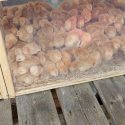Fish crammed together and an endangered environment: no to the expansion of the Aquafrais fish farm
Fish crammed together and an endangered environment: no to the expansion of the Aquafrais fish farm
23.07.2025
Alpes-Maritimes
Fish crammed together and an endangered environment: no to the expansion of the Aquafrais fish farm
Animaux sauvages
The silent suffering of sea bream in fish pens. This is what is revealed by our images of the fish farm run by the Cannes-based company Aquafrais which has been “producing” fish for over thirty years. In July 2023, the prefecture gave the green light to its subsidiary Azur Fish to set up a new sea bream and sea bass farm off the coast of Golfe-Juan. This will double the company’s production and the number of animals falling victim to its greed, while damaging precious natural areas. We oppose this destructive project and support the appeal that has been lodged!
Fish suffering in pens
Aquafrais’ plan is simple: to close some of its small farms in Cap d’Antibes and Théoule-sur-Mer and add a new sea bass and sea bream farm to its operations, which would cover no less than 24,000 square metres, or the equivalent of three football pitches. This is a huge expansion for this fish farm which already “produces” 600 tonnes of fish per year. Twice as many fish will now pass through its hands.
Although the company prides itself on working “sustainably, letting nature take its course”, it’s a safe bet that the version of the fish it catches at sea, fresh out of the egg, would be quite different… Transported by boat to their “production” site, they are then confined in aquatic enclosures with 40 to 50 fish per cubic metre. There they remain for three years, suffering from stress, parasites, disease and even depression. Once they reach adult size, they are taken out of the water using nets to be killed on the spot before being sent “fresh” to the four corners of France…
generics.video.play
Wildlife and flora under threat
As if the exploitation of these individuals were not enough, it also had to be established within the Natura 2000 site ‘Baie et Cap d’Antibes – Îles de Lérins’ and close to two marine areas of special interest for ecology, fauna and flora (ZNIEFF).
It is on this extremely rich coastline, home to numerous Posidonia plants, a flowering marine plant classified as a protected species, that the captive sea bream and sea bass will dump their waste… and with it all the drug molecules they will have been forced to ingest. Between this pollution and the risk of crossbreeding with wild sea bream, this is definitely a fine example of respect for nature!
A project that runs counter to all progress
With big money as their only horizon, the authorities have no intention of stopping there. In its program “Aquaculture for the Future 2021-2027”, the government plans to double the national production of sea bream and sea bass. There is no concern for the suffering of farmed fish. Nor for all those caught in the wild to be processed into fishmeal and fish oil (FMFO) to feed the former. Nor even for the humans in FMFO-producing regions, who are seeing the wild fish on which their diet depends disappear at an alarming rate, as is the case in West Africa.
And the worst is yet to come! With global warming, new pathogenic bacteria will develop, causing disease in aquaculture farms and thus an ever-increasing use of antibiotics. With the government, it’s always the same thing: when we’re heading straight for the wall, we speed up even more!
We support the request lodged by former MEP Caroline Roose against the expansion of Aquafrais’ activities, and we are ready to participate in the appeal if it is rejected by the administrative court. For the sake of fish and a sustainable future for all, we are calling for a strict and transparent control of existing fish farms, their prohibition in the vicinity of sensitive natural areas, and above all, a definitive ban on all new fish farms.
Take action by sharing our leaflet on the subject and signing the petition against factory fish farms!
